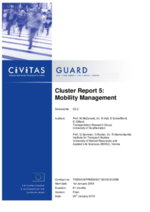Travel planning for schools and work places
Summary
While traditional travel planning has focused on commuting, this measure was designed to introduce a more intense programme of behavioural change.
Implementing sustainable mobility
Norwich County Council worked with schools and workplaces to develop travel plans. The goal was to support 20 local businesses and 80 schools in the production, implementation and monitoring of travel plans to support the improvement of the environmental quality of the area. The travel plans aimed to:
- reduce the negative impacts of traffic such as car parking, congestion, road traffic dangers and environmental pollution by achieving a 5 percent reduction in single-occupancy vehicles;
- improve health by encouraging more people to walk and cycle rather than travel to work or school by car;
- widen travel choice and improve accessibility by encouraging more people to use public transport and car-sharing schemes.
The work was undertaken by travel plan officers who assisted organisations to look for ways to encourage employees or students to use more sustainable methods of transport for their daily commute. The plans were tailored to particular sites and included a range of measures, such as:
- setting up a car-pooling scheme;
- encouraging walking and promoting the associated health benefits;
- providing cycling facilities/paths;
- negotiating improved bus services;
- offering attractive, flexible working practices;
- restricting and/or charging for car parking; and
- setting up video conferencing facilities to cut business travel.
Progress
All target schools and workplaces developed travel plans and a range of initiatives were developed to support travel plan implementation, including walking schemes (such as “park and stride” where cars are parked away from the school and the rest of the trip is made on foot); “bike and breakfast” schemes for workplaces and schools; presentations on car sharing and eco-driving at workplaces; and bike loan clubs.
Outcomes
100 percent of targeted schools approved travel plans (88 schools). Collectively, the schools achieved a 10.3 percent reduction in single-occupancy car trips. A School Run Park and Ride Scheme was successfully launched, selling 5,400 bus tickets in the first term.
All 20 targeted workplaces approved travel plans and implemented a range of initiatives. The four largest employers were closely monitored and produced positive modal shift results between 4 and 18 percent. Ten car-sharing schemes were implemented and two shuttle bus initiatives reduced parking by significant amounts at several key sites in Norwich.
The Network Group set up for businesses at the Broadland Business Park successfully implemented a car-sharing scheme; promoted eco-driving, cycling, walking and public transport through its website; organised a range of promotional events; and implemented restrictive parking schemes.









